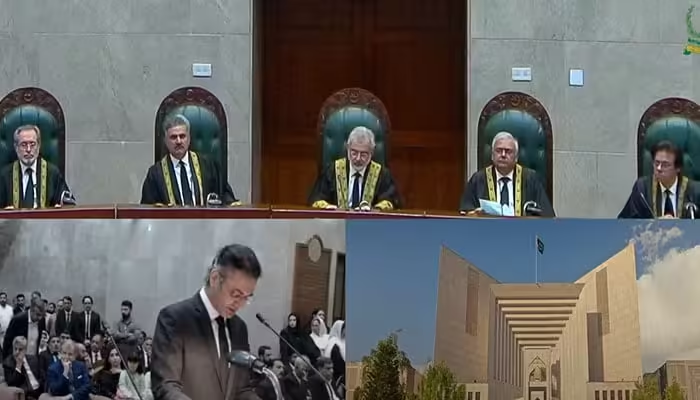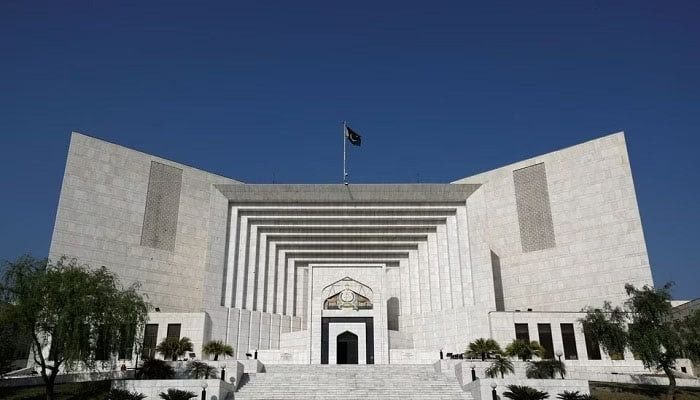In a solemn and significant gathering held at the Supreme Court, Chief Justice of Pakistan, Qazi Faiz Isa, reflected on his journey in the judiciary, offering insights into his experiences, values, and responsibilities. The full court reference, organized in his honor, was attended by the Chief Justice-designate Yahya Afridi, all sixteen Supreme Court judges, and Justice Isa’s family, including his wife.
The event marked a poignant moment in Justice Isa’s career as he shared his reflections on the judicial role, its impact on society, and the challenges of delivering justice impartially.
A Call That Changed Everything
During his address, Justice Qazi Faiz Isa narrated a personal story that underscored his humility and dedication to public service. He recalled receiving a phone call from the Chief Justice at the time. Expecting a reprimand for an article he had written in an English newspaper, Justice Isa was instead surprised by an invitation to serve as the Chief Justice of Balochistan.
Reflecting on his time in Balochistan, Justice Isa acknowledged the challenges he faced in a province with unique social, economic, and political issues. He credited his wife’s encouragement and support during this period, though he noted that she preferred to stay out of the public eye, humbly declining any recognition for her role in his career.
The Judicial Role and the Pursuit of Truth
Justice Isa spoke candidly about the judiciary’s complex role in upholding justice while being fair to all parties involved. He emphasized that, in the legal system, decisions inevitably affect different parties in different ways. He likened this to a document that might be favorable to one party and detrimental to the other, stating, “Only Allah knows what is the truth.”
This remark highlights the weight of judicial responsibility and the need for humility. Justice Isa reminded the audience that a judge’s duty is to interpret the law without bias, irrespective of the outcomes for individuals or groups involved. His comments resonated with a commitment to maintaining neutrality in all judicial proceedings.
Challenges and Reflections on Freedom
Justice Isa shared that he has never intervened in creating the court’s causal list, maintaining his stance against any undue influence over judicial proceedings. Acknowledging that he might have made incorrect judgments, he underscored that all human actions are susceptible to error, and it is essential to learn from these mistakes.
As he approaches the final days of his tenure, Justice Isa expressed a sense of freedom, both personal and professional. He noted that his imminent departure from office would grant him a new perspective on the impact of his judgments and decisions. He conveyed hope that his service would leave a positive imprint, fostering a legacy of integrity, justice, and ethical principles.
Addressing the Need for Judicial Integrity
In his address, Justice Isa indirectly touched upon the importance of judicial transparency and integrity, especially in an era when the judiciary is under public scrutiny. The Chief Justice’s comments appeared to emphasize the need for reform within the judiciary to ensure it remains an institution grounded in truth and justice, free from external pressures and influence.
His reflections come at a time when the judiciary’s role in Pakistan is especially critical, as the country faces multiple social, political, and economic challenges. Justice Isa’s remarks can be seen as a call for greater accountability within the judicial system to ensure it serves the people without prejudice or partiality.
A Legacy Rooted in Ethical Principles
Justice Qazi Faiz Isa’s tenure has been marked by his consistent commitment to justice, truth, and ethics. He has taken on cases that demand not only legal knowledge but also courage, especially in a nation where judicial decisions can have far-reaching implications. His dedication to the law and his unwillingness to compromise on principles have earned him the respect of colleagues and citizens alike.
Justice Isa has often emphasized the judiciary’s role as a pillar of democracy, responsible for safeguarding citizens’ rights and maintaining societal order. His reflections during the full court reference serve as a reminder of the judiciary’s pivotal function and the personal sacrifices involved in carrying out these responsibilities with integrity.
A Farewell to the Bench
As he addressed the assembly, Justice Isa’s words served as both a reflection on his past service and a message for the future of the judiciary in Pakistan. His impending departure signifies a shift in the judicial landscape, and his legacy will undoubtedly inspire future judges to uphold the values of fairness, truth, and impartiality.
Justice Qazi Faiz Isa’s career is a testament to the strength required to serve in a position where decisions are never without consequence, and where impartiality is both a responsibility and a burden. His journey reflects the essence of judicial service — a dedication to upholding justice for all, with an unwavering faith in the truth.



